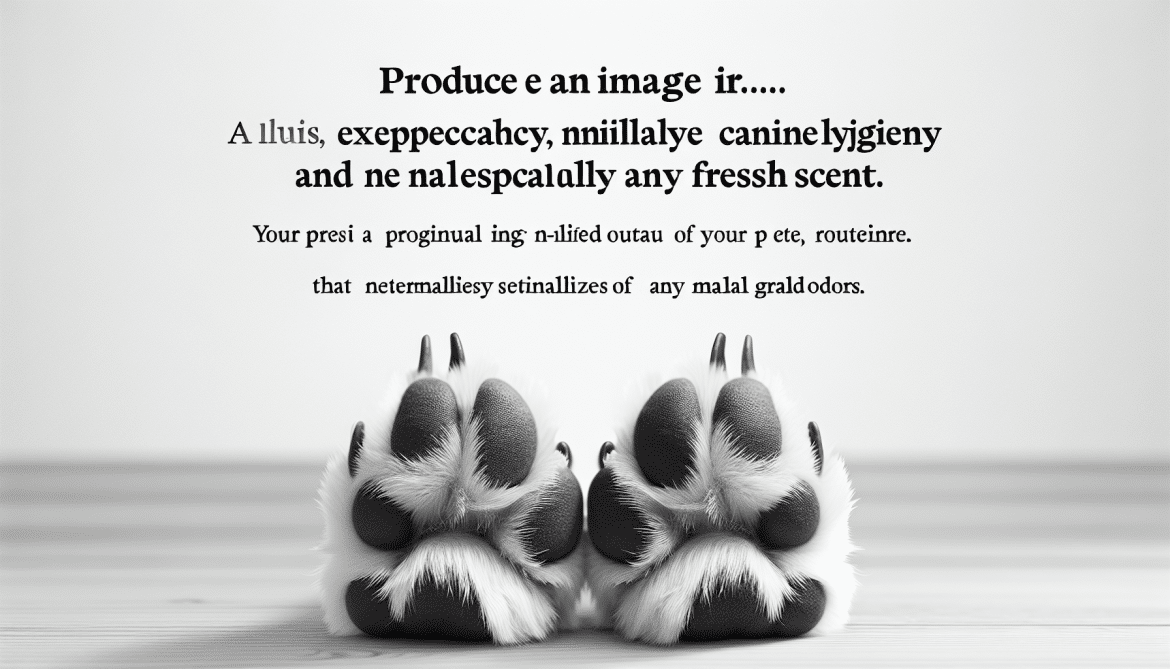You never thought you'd find yourself researching how to tackle the odorous problem of canine anal gland smells, but here you are. Don't worry, we've all been there. Whether you're a seasoned dog owner or a first-time pup parent, dealing with that distinctive and unpleasant odor can be quite a challenge. In this article, we'll explore effective ways to address and neutralize those pesky canine anal gland smells, leaving your four-legged friend smelling fresh and you with a happier nose. So, let's dive right in and discover the secrets to banishing those unwanted aromas once and for all.
Understanding Canine Anal Glands
What are canine anal glands?
Canine anal glands, also referred to as anal sacs, are small sacs located on either side of the anus in dogs. These glands play an important role in scent marking and communication among canines. They produce a secretion that contains a distinct odor, which is released when a dog defecates or is under stress.
Why do they produce odors?
The primary purpose of canine anal glands is to mark territory and communicate with other dogs. The scent released by the anal glands helps dogs recognize each other and gather information about the individuals they encounter. The odor produced by these glands can vary in intensity and can be quite pungent at times.
How do you know if your dog's anal glands need attention?
If your dog's anal glands become impacted or infected, it can cause discomfort and a noticeable odor. Some signs that your dog's anal glands may need attention include scooting or dragging their bottom along the ground, excessively licking or biting the anal area, and a foul smell around the tail region. If you notice any of these signs, it is important to address the issue promptly to prevent further complications.
Methods to Address Canine Anal Gland Smells
Regular expression of anal glands
Regular expression of anal glands is the most common method used to address anal gland smells in dogs. This process involves manually emptying the sacs to relieve any buildup of fluid or impurities. While this can be done at home, it is recommended to seek guidance from a professional on how to safely and effectively express the anal glands.
Consulting a veterinarian
If you are unsure about how to express your dog's anal glands or if your dog is experiencing recurring issues with their anal glands, it is best to consult a veterinarian. Veterinary professionals have the expertise and tools needed to properly express the anal glands without causing harm to your dog. They can assess the condition of the glands and recommend appropriate treatment options.
Changing diet and adding fiber
Diet plays a crucial role in the overall health of your dog, including the health of their anal glands. Switching to a high-quality, balanced diet that is free from common allergens can help reduce the occurrence of anal gland issues. Additionally, adding fiber to your dog's diet can promote regular bowel movements, which can aid in preventing anal gland impaction.
Providing proper hydration
Proper hydration is essential for maintaining your dog's overall health, including the health of their anal glands. Ensuring that your dog has access to clean, fresh water at all times encourages them to drink an adequate amount of water. This helps keep the stools soft and allows for easier emptying of the anal glands during defecation.
Using topical treatments
Topical treatments can be used to neutralize the odor coming from your dog's anal glands. There are various products available, such as sprays and wipes, that can be applied to the anal area to reduce the smell. However, it is important to choose products that are safe for dogs and follow the instructions carefully to avoid any adverse reactions.

This image is property of images.pexels.com.
Regular Expression of Anal Glands
What is the process of expressing anal glands?
Expressing anal glands involves gently applying pressure to the sacs to release the fluid they contain. This can be done externally by applying gentle pressure on the area around the anus or internally by inserting a gloved finger into the rectum to exert pressure directly on the glands. It is important to exercise caution and follow proper technique to ensure the process is done safely and effectively.
How often should anal glands be expressed?
The frequency of expressing anal glands depends on the individual dog. Some dogs naturally empty their anal glands while defecating, while others may require manual expression. As a general guideline, if your dog is experiencing recurrent issues with their anal glands, expressing them every 4-6 weeks may help prevent impaction or infection. However, it is best to consult with a veterinarian to determine the appropriate frequency for your specific dog.
Tips for safely expressing anal glands at home
If you decide to express your dog's anal glands at home, it is important to follow these tips to ensure the process is done safely:
- Use disposable gloves and ensure your hands are clean before starting the process.
- Apply gentle pressure to the anal area using a clean cloth or tissue. Avoid applying excessive force, as it may cause discomfort or injury.
- If you are comfortable doing so, you can also try using a gentle circular motion around the anal area to help release the fluid.
- Be prepared for the release of fluid and have a towel or tissue ready to catch it.
- After expressing the anal glands, clean the anal area with a damp cloth or unscented baby wipe to remove any residual secretion.
Remember, if you are unsure or uncomfortable with expressing your dog's anal glands, it is always best to seek professional assistance from a veterinarian or a trained groomer.
Consulting a Veterinarian
When should you consult a veterinarian?
While expressing anal glands can sometimes be done at home, there are certain situations where it is best to consult a veterinarian:
- If you have never expressed anal glands before and are unsure about the technique.
- If your dog's anal glands are impacted or infected, which can cause severe discomfort and require medical intervention.
- If you notice any unusual symptoms or changes in your dog's behavior, such as excessive scooting or persistent licking of the anal area.
A veterinarian will be able to assess the condition of your dog's anal glands, provide proper treatment, and offer guidance on how to prevent future issues.
Professional techniques for expressing anal glands
Veterinarians have specialized training and experience in expressing anal glands. They may use different techniques depending on the size and location of the glands. Some common professional techniques include manual expression using gloved fingers or the use of specialized tools that apply gentle pressure to the sacs. These techniques ensure that the anal glands are fully emptied and reduce the risk of complications.
Potential underlying health issues causing strong smells
Strong smells from the anal glands can sometimes indicate underlying health issues in dogs. These may include infections, allergies, or gastrointestinal problems. It is important to consult a veterinarian if you notice persistently strong odors or other concerning symptoms, as they can help identify and address any underlying health conditions.

This image is property of images.pexels.com.
Changing Diet and Adding Fiber
Effect of diet on anal gland health
Diet plays a crucial role in maintaining the health of your dog's anal glands. A poor diet can lead to soft stools, which do not provide enough pressure on the anal glands during defecation to help them naturally empty. Additionally, some dogs may have food allergies or sensitivities that can contribute to anal gland problems.
Recommended changes in diet
To promote anal gland health, it is important to feed your dog a balanced diet that consists of high-quality ingredients. Look for dog foods that are formulated to support digestive health and do not contain common allergens such as wheat, soy, or corn. Additionally, adding fiber to your dog's diet can help regulate bowel movements and promote the emptying of the anal glands.
Importance of fiber in promoting regular bowel movements
Fiber plays a vital role in promoting regular bowel movements and preventing anal gland issues. It adds bulk to the stool, which helps stimulate the muscles surrounding the anal glands during defecation. This increased pressure helps to naturally empty the glands and prevent impaction. Adding fiber-rich foods to your dog's diet, such as pumpkin or psyllium husk, can be beneficial. However, it is important to introduce any dietary changes gradually to avoid digestive upset.
Providing Proper Hydration
How does hydration affect anal glands?
Proper hydration is essential for maintaining optimal bowel health, which in turn affects the health of the anal glands. When a dog is adequately hydrated, their stools are more likely to be soft and easy to pass. Soft stools exert more pressure on the anal glands during defecation, helping them empty naturally. On the other hand, dehydration can lead to dry and hard stools, which may contribute to anal gland impaction.
Encouraging your dog to drink more water
To ensure your dog remains adequately hydrated, there are several steps you can take:
- Always provide fresh and clean water in a clean bowl.
- If your dog is not drinking enough water, consider using a pet water fountain, as many dogs prefer running water.
- Add a small amount of low-sodium chicken or beef broth to your dog's water to make it more enticing.
- Monitor your dog's water intake and encourage them to drink more by offering water at regular intervals throughout the day.
- If you have concerns about your dog's hydration, consult with your veterinarian for further guidance.
Alternative hydration methods for dogs
In addition to drinking water, there are other ways to ensure your dog remains properly hydrated. Wet food, bone broth, and homemade hydrating treats can contribute to your dog's overall water intake. These alternative hydration methods can be especially beneficial for dogs who are not fond of drinking water or for those who require additional water intake due to health conditions or medications.

This image is property of images.pexels.com.
Using Topical Treatments
Types of topical treatments for neutralizing anal gland smells
There are various topical treatments available that can help neutralize the odor coming from your dog's anal glands. Some common types of topical treatments include sprays, wipes, and shampoos specially formulated to neutralize odors. These products often contain natural ingredients that help eliminate the smell without causing irritation or discomfort to your dog.
How to safely apply topical treatments
When using topical treatments on your dog's anal area, it is important to follow the product instructions carefully. Here are some general tips for safely applying topical treatments:
- Always read and follow the manufacturer's instructions and guidelines.
- Ensure the product is specifically formulated for use on dogs and is safe for topical application.
- Apply the product sparingly and avoid getting it directly into the anus.
- Gently massage or pat the product onto the fur or skin around the anal area.
- Keep an eye out for any signs of skin irritation or allergic reactions, and discontinue use if necessary.
Tips for choosing the right topical treatment for your dog
When selecting a topical treatment, consider the following factors:
- Look for products that are specifically designed to neutralize anal gland odors.
- Choose products that are made with natural ingredients and are free from harsh chemicals or artificial fragrances.
- Read reviews and seek recommendations from other dog owners or your veterinarian.
- Consider your dog's specific needs, such as any allergies or sensitivities they may have.
By choosing the right topical treatment, you can effectively manage and reduce the odor resulting from your dog's anal glands.
Preventing Canine Anal Gland Odors
Maintaining a regular grooming routine
A regular grooming routine is essential for preventing anal gland odors in dogs. This includes brushing your dog's fur regularly, particularly around the anal area. Brushing helps remove loose hair and debris that can contribute to the buildup of odor-causing substances. Additionally, regular grooming sessions allow you to monitor the health of your dog's anal glands and take necessary action if any issues arise.
Ensuring proper hygiene around the anal area
Proper hygiene is crucial for preventing anal gland odors. Ensure that your dog's anal area is kept clean and free from fecal matter or debris. Some dogs may require the occasional gentle wipe or wash around the anal area to maintain cleanliness. However, it is important to use mild, pet-safe products and avoid over-cleaning, as excessive cleaning can disrupt the natural balance of the anal glands.
Monitoring your dog's bowel movements
Keeping a close eye on your dog's bowel movements is an important part of preventing anal gland issues. If you notice any changes in the frequency, consistency, or color of your dog's stools, it could indicate an underlying problem. Regular and healthy bowel movements help ensure that the anal glands are being emptied naturally during defecation, reducing the risk of impaction or infection.
Common Myths and Misconceptions
Myth: Expressing anal glands is harmful or unnecessary
One common myth is that expressing anal glands is harmful or unnecessary for dogs. However, when performed correctly and with the guidance of a professional, expression of anal glands can provide relief and prevent more serious issues from arising. It is important to address anal gland smells promptly to avoid discomfort and potential complications.
Myth: Strong anal gland odor indicates a dirty dog
Another misconception is that a strong anal gland odor indicates a dirty dog. However, anal gland smells are not directly related to cleanliness. The odor is produced by the glands themselves and can vary in intensity from dog to dog. Regular grooming and hygiene practices can help manage and minimize the odor, but they do not eliminate the natural scent produced by the glands.
Misconception: Scented products can eliminate anal gland smells
It is important to note that scented products cannot fully eliminate anal gland smells. While scented sprays or wipes may temporarily mask the odors, they do not address the underlying issue. These products should be used in conjunction with proper anal gland care techniques, such as regular expression, diet management, and hygiene practices, to effectively manage and minimize anal gland odors.
Conclusion
Addressing and neutralizing canine anal gland smells is essential for the comfort and health of your dog. Understanding the purpose of anal glands and implementing appropriate measures can help prevent discomfort, infection, and potential complications. Regular expression of anal glands, consultation with a veterinarian, dietary changes, proper hydration, and the use of topical treatments can all contribute to managing anal gland smells. By incorporating these proactive steps into your dog's routine, you can ensure their comfort and overall well-being. Remember to maintain a regular grooming routine, practice proper hygiene, and monitor your dog's bowel movements to prevent anal gland issues. Taking these measures will contribute to a happy and healthy life for your canine companion.


